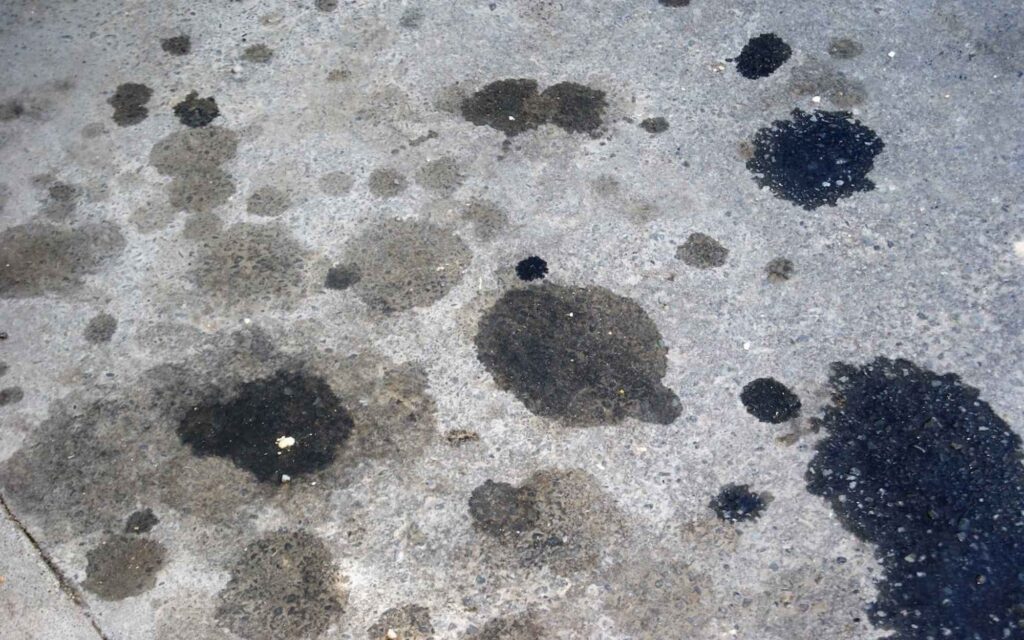Oil spills on concrete can seem like a minor inconvenience, but left untreated, oil stains can become a major problem. The question often arises: How long does oil stay on concrete if not cleaned? The answer depends on a variety of factors — including the amount of oil, the type of concrete, and the exposure to the elements.In this blog, we’ll explore how quickly oil penetrates concrete, what happens if it’s not cleaned, and how to prevent long-term damage to your surfaces.

How Oil Penetrates Concrete
Concrete is naturally porous — meaning it easily absorbs liquids. When oil spills onto your driveway or garage floor, it seeps into the concrete’s tiny pores.
Without cleaning, the oil can be trapped deep within the surface, making it difficult to remove.
Here’s how it typically breaks down:
| Time | Effect |
| First 24 hours | Oil sits on top, easy to remove if caught early. |
| 1–3 days | Oil starts to seep into the surface, staining concrete. |
| After 3 days | Oil becomes absorbed and may need advanced cleaning methods. |
💡 Not sure how to start cleaning? Check out: How to Remove Oil Stains from Concrete: Best DIY Methods & Cleanup Tips
What Happens to Oil Left on Concrete Over Time?
1. Oil Spreads and Stains Deep
Over time, oil will continue to spread across the concrete surface, especially if the concrete is unsealed. The longer the oil sits, the deeper it gets.
2. Concrete Weakens and Discolors
Oil, especially motor oil, can weaken concrete. The stain left behind can darken the concrete, and in extreme cases, may cause the surface to deteriorate, especially in freeze-thaw conditions.
🚨 Warning: Leaving oil on concrete for long periods can make it almost impossible to clean without professional equipment. Need a guide for old stains? Read: How to Remove Oil Stains from Concrete: Best DIY Methods & Cleanup Tips
How Long Does It Take for Oil to Get Permanent?
For motor oil, cooking oil, or other greasy substances, it can take as little as 24 to 48 hours for the oil to become permanently embedded in unsealed concrete.
Once oil seeps deep into the pores, simple cleaning methods won’t work. Advanced products or even pressure washing might be needed.
🧴 Want help with product recommendations? Read: Best Products to Remove Oil Stains from Concrete
How to Prevent Oil from Staining Concrete Permanently
1. Seal Your Concrete
The most effective way to protect concrete from oil stains is to apply a penetrating sealer. Sealing prevents oil from soaking in and helps you clean up spills much more easily.
🔑 Learn how sealing works: Can Sealing Concrete Help Avoid Future Oil Stains?
2. Clean Immediately After Spills
The sooner you clean an oil spill, the easier it is to prevent a permanent stain. For fresh oil stains, blot with paper towels or kitty litter. Follow up with a degreaser for thorough cleaning.
✅ Start here: How to Remove Oil Stains from Concrete: Best DIY Methods & Cleanup Tips

What to Do If the Oil Stain Is Already Deep?
1. Use Commercial Cleaners
If the oil has set in, you’ll need a concrete-safe degreaser or oil stain remover like:
- Oil Eater Cleaner
- Simple Green HD
- Pour-N-Restore
These products break down the oil, making it easier to lift out of the concrete pores.
🧽 Check out our guide to products here: Best Products to Remove Oil Stains from Concrete
2. Pressure Washing
For old or widespread stains, pressure washing can be an effective method to remove the oil. Combine with a degreaser for best results.
💧 Curious if this will work? See: Will Pressure Washing Remove Oil Stains from a Driveway?
FAQs
How can I tell if oil has seeped into the concrete?
You’ll notice dark spots that don’t come off with simple cleaning. These stains often feel oily to the touch and are harder to remove the longer they sit.
Can sealing concrete remove oil stains?
No, sealing prevents future stains but won’t remove existing ones. Cleaning must come first, then sealing will keep it from happening again.
🌟 Find out how sealing helps: Can Sealing Concrete Help Avoid Future Oil Stains?
How do I prevent oil stains from happening in the future?
Apply a high-quality sealer, clean spills immediately, and use protective mats in areas where oil is likely to spill.
🧴 Check our prevention blog: How to Stop Oil Stains Before They Happen



